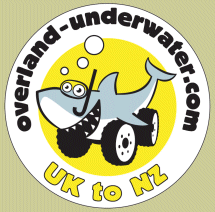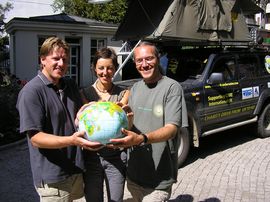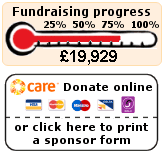| Final Statistics: Alex & Maz | Total distance: 93,550km |
| Furthest Point: Rotorua, NZ | Now settled in Sydney, Australia |
| Final Statistics: Martin | Total distance: 79,698km |
| Furthest Point: Hobart, Australia | Now settled in Bristol, UK |
Visit to Care International Schooling Projects in Rural Uttar Pradesh
India, Country 15, Diary entry 6th Feb 2006, Total distance in India: 7133km
As we have explained before, when we set about planning our overland expedition and started researching some of the poorer areas through which we'd travel, we came to realise how fortunate we are to be able to undertake such a journey and we pledged our efforts to use our trip as a means of raising money to help the excellent work undertaken by Care International.
One of the main things we wanted to see during the expedition was how money donated to Care is used. Care International supports a staggering 870 poverty-fighting projects in 70 countries, reaching more than 45 million of the world's poorest people. India is a country in which Care is very active and we particularly wanted to visit a project in India on our way through.
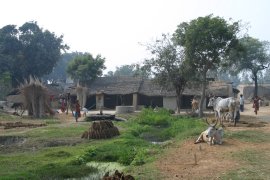 Unfortunately this proved more difficult to organise than we had expected, mainly due to the need to fit around the day-to-day work Care India have to do - it wouldn't do for us to turn up when not convenient and just get in the way! Finally after many emails and phone calls we managed to arrange a visit to some schooling projects in rural Uttar Pradesh, but it was after Alex and Maz had made plans to fly to the Andaman Islands leaving me to hold the fort on my own.
Unfortunately this proved more difficult to organise than we had expected, mainly due to the need to fit around the day-to-day work Care India have to do - it wouldn't do for us to turn up when not convenient and just get in the way! Finally after many emails and phone calls we managed to arrange a visit to some schooling projects in rural Uttar Pradesh, but it was after Alex and Maz had made plans to fly to the Andaman Islands leaving me to hold the fort on my own.
I travelled to Lucknow to meet Jami and Alok, the Care India representatives early in the morning before a bone-jarring 4 hour ride in an Indian jeep across broken tarmac and dirt roads to the small town of Hardoi. Also present was Carol Monoyios who is Marketing Director at the Care UK office on a whistle-stop tour of projects and potential sponsors in Asia for the first time since joining the charity six months ago.
Visit to Community Schooling Project in Saidpur
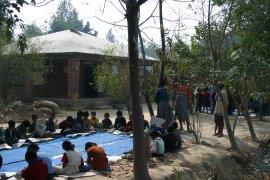 Our first stop was the tiny and remote village of Saidpur to see an example of a community schooling project set up by Care India about 6 years ago.
Our first stop was the tiny and remote village of Saidpur to see an example of a community schooling project set up by Care India about 6 years ago.
Prior to this initiative there were no schooling facilities provided to children in the remote communities of Uttar Pradesh. Care India worked closely with the local communities to define the model for the community school. A person from the community is chosen to become the teacher and receives their salary and training from Care, and the funds to start the school (books and other materials) are provided by Care. Other overheads such as the school building are provided by the community.
At Saidpur school there are currently 50 children, split into two groups by age: under 6 and 6-10, and they study from 10am to 3pm every day except Sunday. On the day we visited the classes were being held outdoors on two large tarpaulins, but during the monsoon season or if the weather is too hot then they can move indoors into the school building, which has been specially designed to allow several classes to be taught at once in different parts of the single room.
Care India is lucky to have on its staff some experts in education and so the teaching methods they have defined for the schools are very modern. We saw plenty of interaction between the children and teacher coupled with working on projects in small groups, instead of the old-fashioned learning-by-rote system still favoured in the majority of government schools in India.
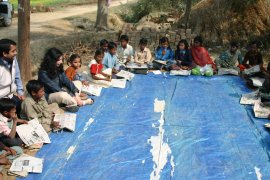 Care India has also defined the curriculum which in addition to the standard reading, writing and arithmetic, includes such subjects as critical thinking and social learning meaning health, media, family, the panchayat (local government) etc. This curriculum developed by Care is now starting to be adopted by government schools!
Care India has also defined the curriculum which in addition to the standard reading, writing and arithmetic, includes such subjects as critical thinking and social learning meaning health, media, family, the panchayat (local government) etc. This curriculum developed by Care is now starting to be adopted by government schools!
From this one school, 98 children who would otherwise have had no education at all, have gone on to secondary education. Care has set up 90 such schools around Uttar Pradesh but there are still very many communities with no schools at all. The Indian government have recently changed their policy and are starting to introduce schools to remote communities (copying the Care model!) but it is taking some time. A small, reactive charity like Care can respond very quickly and set up schools in a matter of weeks or months as long as the funds are available so donations from the public are needed to help them. To wait for the government to introduce schools to all the remote communities would be to condemn several years' worth of children to grow up without education.
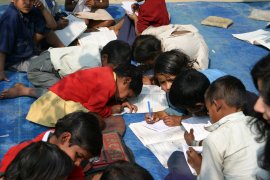 The costs for setting up such a school are very low: around Rs.6000 (around �76 sterling or $136 US) to train the teacher and buy a few books. The school building and its land is provided by the community at no cost to Care.
The costs for setting up such a school are very low: around Rs.6000 (around �76 sterling or $136 US) to train the teacher and buy a few books. The school building and its land is provided by the community at no cost to Care.
The annual cost of running a school is Rs.15000-18000 per year (�190-229 sterling, $339-407 US) which covers the teacher's salary at around Rs.1200 per month and a few replacement books and materials.
This works out at less than �5 per child per year for a basic education, not even considering that many children take their learning home with them and pass it on to the rest of the family!
The Udaan Residential School for Girls
The Udaan Residential School is a part of Care India's efforts for the education of girls from marginalised groups and provides learning opportunity to girls in the age range 10-14 years.
Care India together with a partner NGO called Sarvodaya Ashram founded the Udaan school in 1990, taking 100 girls from remote communities who had been deprived of a basic education and providing them with a ten month course of intensive schooling up to a level equivalent to Grade V in the formal school system.
 The school basically consists of two long halls with a blackboard at each end making four classroom areas, and along the length of the hall are long benches which serve as the dormitory area for the girls. Along each long wall were padlocked trunks containing the girls' belongings and their numbered thali dishes. Not my idea of luxury accommodation but it serves the purpose!
The school basically consists of two long halls with a blackboard at each end making four classroom areas, and along the length of the hall are long benches which serve as the dormitory area for the girls. Along each long wall were padlocked trunks containing the girls' belongings and their numbered thali dishes. Not my idea of luxury accommodation but it serves the purpose!
One of the major obstacles which Care had to overcome was the attitude that education for girls is unimportant, and that they couldn't be spared from their paid work or domestic chores. A three-day camp was organised as a forerunner to the actual program and the 68 girls taking part were exposed to various learning games and activities after which time the parents were invited back. They could see their girls reciting poems on stage, writing their names etc. and many parents thought that if this much could be achieved in three days, it is worth sending them for ten months.
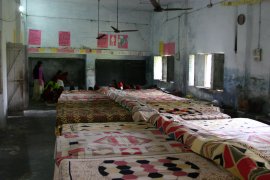 They were so successful in changing the parents' attitudes that there were 250 applicants for the 100 spaces in the first year - unfortunately the level of funding meant that increasing the student intake was impossible and many girls were disappointed, but the decision was made to accept older girls from the age range 12-14 leaving the younger ones another chance in subsequent years. With more funds, more girls could benefit from this education.
They were so successful in changing the parents' attitudes that there were 250 applicants for the 100 spaces in the first year - unfortunately the level of funding meant that increasing the student intake was impossible and many girls were disappointed, but the decision was made to accept older girls from the age range 12-14 leaving the younger ones another chance in subsequent years. With more funds, more girls could benefit from this education.
 Now this project is established, the running cost is around Rs.10000-12000 (�127-152 sterling, $226-271 US) per student for the ten month course, and Care is looking at founding a second school on the same site (being a residential camp the location is unimportant and this has the advantage of being able to share some resources like a library). Care needs funds to achieve this dream.
Now this project is established, the running cost is around Rs.10000-12000 (�127-152 sterling, $226-271 US) per student for the ten month course, and Care is looking at founding a second school on the same site (being a residential camp the location is unimportant and this has the advantage of being able to share some resources like a library). Care needs funds to achieve this dream.
At the end of a fascinating and enlightening day we travelled the 4 hour ordeal of a jeep ride back to Lucknow. It was very moving to see how Care's work has affected the lives of so many people for the better, but it is still important to remember that many of the villages through which I travelled on this day and on many others during my time in India would have no provision for education.
With Care's help, the cycle of illiteracy and under-education can be broken. Many of you have already been kind enough to make generous donations and we have raised �12,038 so far, which is enough to make a real difference to a lot of lives around the world. We thank everyone for helping us achieve such an impressive sum, however we do need your continued help to achieve our �25,000 target and any pennies or pounds you can donate would be very much appreciated.
You can donate online by clicking the button in the menu bar to the left. You can donate by debit or credit card. Alternatively you can print a sponsor form by clicking the button in the menu bar to the left if you prefer to send a cheque to Care by post.
Please dig deep, even if you have already sponsored us. Small amounts of money can make a big difference to children in Uttar Pradesh so even if you can't afford much, please donate what you can. Someone somewhere will see the benefit.
| All content copyright � overland-underwater.com - please do not use without permission. |
| Comment from The Father |
| With this diary entry as an apposite and timely reminder it's time to honour our commitment of donating to Care "per diary page". Your guest diarists share some of the credit for providing interesting insights and helping you to catch up. Well done and keep it going. |
| 01 Apr 2006 @ 17:32:07 |
